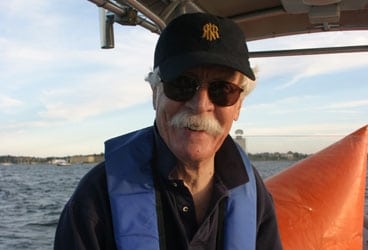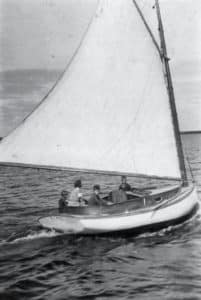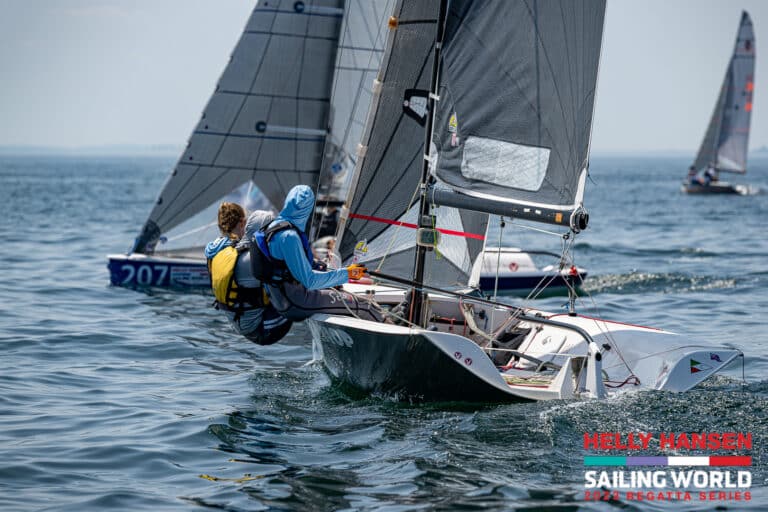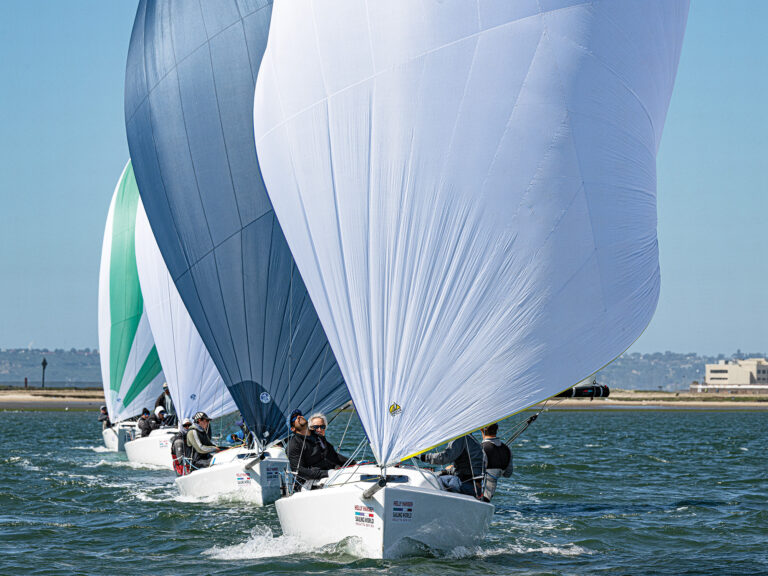
HWRCDuty368
It was a beautiful late-August Thursday evening, an absolutely perfect night for sailboat racing, and on just about every summer Thursday night for the last two decades that’s precisely what I’ve set out to do: race J/24s here in Newport, Rhode Island, with the local Fleet 50 armada. But not this particular Thursday. For this year, each week, it’s been decreed that one boat will send a pair of volunteers to serve on the race committee. I’d drawn the short straw so instead of trimming sails I’d be dropping marks and hauling anchor rodes. And frankly, I was none too happy about it.
Among the crew on skipper Ian Scott’s Crack of Noon are a pair of sailors well known to readers of Sailing World, editors Dave Reed and Stuart Streuli. Stu knew that if he were given the opportunity, our softhearted captain would take the bullet and volunteer himself, so he clandestinely contacted the crew without Ian’s knowledge to work out who’d do the RC duty. I can’t quite recall the details, but he’d concocted some ridiculous numbers quiz–the MIT card sharks portrayed in the movie 21 had nothing on him–which he administered via email. Needless to say, Stu didn’t lose this contest: I did. However, the Scott family did not emerge totally unscathed, as Ian’s wife, Joy, graciously stepped forward to assist me.
(Among the several lessons I learned from this episode, chief among them is this: Never trust a Dartmouth graduate.)
Now I’ve done a bit of race-committee work over the years, but always aboard the committee boat proper, never from the mark boat. But Joy and I drew the assignment to help out on the RIB, setting the pin end of the start and finish lines, as well as the leeward mark. We were under the direction of a tall, handsome fellow named John Hall. John, for the record, is 83. Should I make it that far, I reckon I’d be blessed if I retained half of his dexterity and acuity. Oh yeah, he’s also a very fine boat handler.
It was blowing out of the north a good fifteen knots as we made our way out to the racecourse. John had Joy and I inflate one of the big orange buoys and prepare three separate rodes with mushroom anchors from the supply of 50-foot lengths of line: two hundred footers and a one-hundred-and-fifty footer. The previous RC, from a weekend regatta, had left things rather disorderly, and it was a bit of a scramble to get everything organized. The sun sets relatively early in late August, and I felt the pressure to do the job quickly so we wouldn’t hold up proceedings and the PRO could get things off on time. I’ve certainly grumbled on occasion about how long it takes to set a starting line but now that I was an integral cog in the operation I felt a pang of sympathy for those who’d gone before me. Man, this was like work.
So that was the first of my revelations. The second came once the line was set and the starting sequence underway. The whole thing unfolded as if in slow motion; with a good two minutes to go, it was crystal clear who was going to nail the start and who was hosed. It all seemed so simple and obvious with a bird’s eye view from the sidelines. There were, however, several boats that were clearly OCS: John had instructed us to call out and record the sail numbers of competitors who were over early, and there were four or five offenders. They were blanketed from the view of the committee boat but they all got away with it (something that never happens aboard the Crack.
“We don’t call them unless they call us,” said John, as the VHF-radio remained silent. “We’re here to serve.”
On the way out to the course, John had shown us a device he uses for anchor retrieval–a metal, cylindrical contraption–the exact operation of which totally escaped me. “We learned this from those geniuses up on the hill,” said John, pointing in the direction of the New York YC. “But it actually works pretty well.” When the time came to utilize it, however, to pull the leeward mark after the second of two laps, the darn thing was nowhere to be found.
“Senior moment,” said John, peering fruitlessly into lockers as I yanked up the rode hand over hand. It was still just like work. Another revelation: It takes a lot of effort from a lot of folks so I can enjoy myself on the water on a lovely summer’s eve.
But it wasn’t all about industriousness. Actually, once everything was set, we had the opportunity to chat a bit with John, a “gentleman” in the true sense of the word. He’d retired to Newport about twenty years ago after a career with the United Way in New York and Detroit. During his time in the Midwest, he sailed in several Lake Huron-Mackinac Races. I asked him what position he had on the boats. “With my height, I’m sure you can guess where,” he said, nodding toward the bow. “Up there.”
He said he enjoyed his time on the water working on race committee and particularly relished the autonomy of his specific task, which gave him the freedom to watch the races in his own space (“There are some great sailors in this fleet”) and on his own terms. “Look at all the people over there,” he said, casting a gaze at the anchored committee boat. “I’ve had plenty of leadership roles before. I have no desire for any more.”
All told, my night with John turned out to be one unexpected pleasure after another, and it gave me a fresh appreciation for the time and effort it takes to run a race correctly. I won’t be so quick to criticize the RC anymore.
Plus, there was one last bit of enlightenment before the night was through. When John asked me to prepare the rode and anchor for the finish-line buoy, at first I grabbed the wrong mark.
“You’ve been finishing races all year, haven’t you?” he asked, wondering how on earth I failed to recognize the proper buoy.
“I guess that’s my own senior moment,” I said.
With that, John gave me a preview of coming attractions.
“All I can say,” he said, “is get used to it.”









